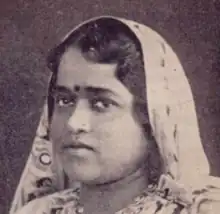Indubala
Indubala (1898 – 30 November 1984), sometimes credited as Miss Indubala, Indubālā Debī, or Indubala Devi, was a Bengali singer and actress. She received the Sangeet Natak Akademi Award in 1975.
Indubala | |
|---|---|
 Indubala, from a 1936 issue of The Indian Listener | |
| Born | 1898 |
| Died | 30 November 1984 (aged approximately 83) |
| Other names | Indubālā Debī, Miss Indubala, Indu Bala |
| Occupation(s) | Singer and actress |
Early life
Indubala was born in Amritsar, the daughter of Motilal Bose and Rajabala. Her parents were with the Great Bengal Circus,[1] and separated soon after her birth. She lived with her mother in Calcutta. She trained as a singer in Calcutta with several teachers, including Gauhar Jaan,[2] Kamal Dasgupta, and Kazi Nazrul Islam.[3]
Career
Indubala is considered one of the great Bengali women singers.[4][5] She made her first of hundreds of recordings for Gramaphone Records in 1915 or 1916.[6][7] She performed on stage with her mother's company, the Rambagan Female Kali Theatre,[8] and at the Star Theatre. She sang on All India Radio beginning in 1927, on the broadcaster's second day on the air, and regularly through the 1930s.[9] In 1936 she was appointed court musician to the Maharaja of Mysore.[10] Beginning in the 1930s she provided playback vocals for sound films, and she acted on-screen in more than two dozen films, including Rajrani Meera (1933), Sati Sulochana (1934), and Naveena Sarangadhara (1936).[11] She retired from the stage in 1950. She received the Sangeet Natak Akademi Award in 1975.[1]
Indubala lived most of her life in the Rambagan neighborhood of Calcutta,[12] and was concerned for the welfare of the actresses and sex workers concentrated in that district. "I am Rambagan's Indu," she declared. "Here I have learnt music, established myself, and got respect."[8]
Personal life
After several years of declining health, Indubala died in 1984, in Calcutta, in her mid-eighties.[3] She is one of the title characters of Bibhutibhushan Bandyopadhyay's short story "Einstein and Indubala" (2016).[13] In 2020 a compilation album of Indubala's recordings was released on vinyl, by Tara Disc.[14]
References
- Chakrabarti, Kunal; Chakrabarti, Shubhra (22 August 2013). Historical Dictionary of the Bengalis. Scarecrow Press. pp. 232–233. ISBN 978-0-8108-8024-5.
- Gupta, Debdutta (17 January 2020). "Indubala Devi – the singing sensation of 1915 Calcutta!". Get Bengal. Retrieved 14 November 2021.
- Guha, Jyoti Prakash (2008). "A short biography of Indubala" (PDF). The Record News: 35–50.
- Murshid, Ghulam (25 January 2018). Bengali Culture Over a Thousand Years. Niyogi Books. ISBN 978-93-86906-12-0.
- Bhattacharya, Rimli (15 May 2018). Public Women in British India: Icons and the Urban Stage. Taylor & Francis. ISBN 978-0-429-01655-4.
- Denning, Michael (1 August 2015). Noise Uprising: The Audiopolitics of a World Musical Revolution. Verso Books. ISBN 978-1-78168-857-1.
- Joshi, G. N. (1988). "A Concise History of the Phonograph Industry in India". Popular Music. 7 (2): 147–156. doi:10.1017/S0261143000002725. ISSN 0261-1430. JSTOR 853533. S2CID 161788875.
- Chakraborti, Bikas (2014). "Mirabai and Indubala: Spiritual Empowerment Redefined". In Banerjee, Debalina (ed.). Boundaries of the Self: Gender, Culture and Spaces. Cambridge Scholars Publishing. pp. 127–139, quote on page 138. ISBN 9781443860789.
- "Miss Indubala". The Indian Listener. 6: 11. 22 December 1940.
- "Books Reviewed" The Indian Listener (22 September 1936): 952.
- Dickey, Sara; Dudrah, Rajinder (24 October 2018). South Asian Cinemas: Widening the Lens. Routledge. ISBN 978-1-317-97729-2.
- Purkayastha, Prarthana (2021). "Outing Pleasure and Indulgence: Indubala's Scrapbook and the Red-Light Dances of Calcutta". Contemporary Theatre Review. 31 (1–2): 14–33. doi:10.1080/10486801.2021.1878502. ISSN 1048-6801. S2CID 234783392.
- Ravi, S. (20 April 2016). "Tales that continue to rankle". The Hindu. ISSN 0971-751X. Retrieved 15 November 2021.
- Discogs, Miss Indubala – Miss Indubala (1889-1984) (2020, Vinyl), retrieved 15 November 2021
External links
- Indubala at IMDb
- Miss Indubala Raga Bhairavi Coln: Rantideb Maitra, a recording by Indubala, on YouTube